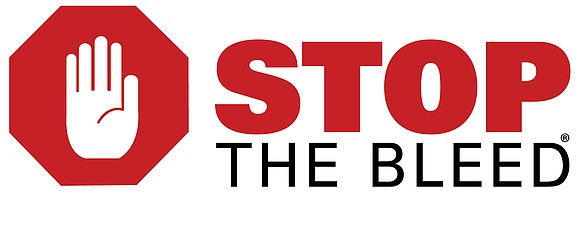It can only take minutes for someone to bleed to death from an accidental wound or in the event of a large-scale mass casualty event. That is why the R Adams Cowley Shock Trauma Center, University of Maryland launched the national “Stop the Bleed” campaign here in Baltimore to encourage the community to get trained in bleeding control techniques to help save a life.
“It’s easy to learn,” said Thomas Scalea, MD, Francis X. Kelly Distinguished Professor of Trauma, University of Maryland School of Medicine and Physician-in-Chief, R Adams Cowley Shock Trauma Center.
“The training is the equivalent of bystander CPR or learning to use an AED. Anyone can learn the life-saving skills of bleeding control, he continued. “It’s simple: if we do not stop the bleeding, the person dies.”
The good news is that anyone at the scene can act as an immediate responder and save lives if they know what to do. Shock Trauma is partnering with the Maryland Committee on Trauma for this initiative. Since the program launch in 2017, more than 16,000 people in Maryland have been trained, greater than 10,000 of them by the Shock Trauma team.
The Baltimore community is invited to learn how to “Stop the Bleed” at the B’More Healthy Expo, Saturday, March 7, from 10 a.m. to 4 p.m. Training is free and open to anyone, any age.
Massive bleeding from any cause, but particularly in a situation where a medical response is delayed can result in death within just five to 10 minutes if bleeding is not stopped. Similar to how the general public learns and performs CPR, it is important for the public to learn proper bleeding control techniques, including how to apply pressure with their hands, pack a wound with dressings and correctly apply tourniquets.
“If we have learned anything in recent years it is that tragedy can strike— it is not hypothetical,” Scalea said. “Through this training, our goal is to provide people with knowledge and skills to be able to stop the bleeding. It is important to be trained correctly so that it can be effective. And while we hope people never have to use it, we want everyone empowered to act.”
And, if you can’t make training at the Expo, you are invited to register at www.mdcot.org or www.bleedingcontrol.org for a free training course. The R Adams Shock Trauma Center, University of Maryland bleeding control training is performed by bleeding-control -trained medical professionals from the University of Maryland Medical Center and Shock Trauma, and includes hands-on instruction and visual presentations.
Habeeba Park, MD, FACS, Assistant Professor, Department of Surgery University of Maryland School of Medicine; Maryland Stop the Bleed® State Champion Vice Chair, Maryland Committee on Trauma; R Adams Cowley Shock Trauma Center, University of Maryland.
